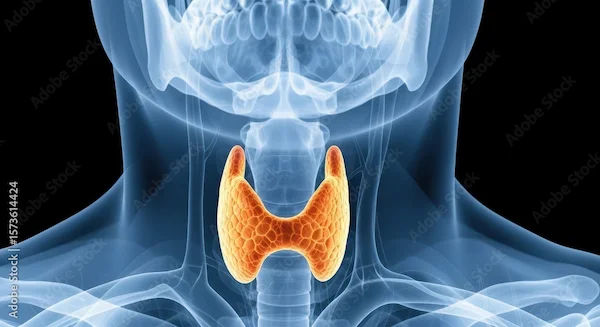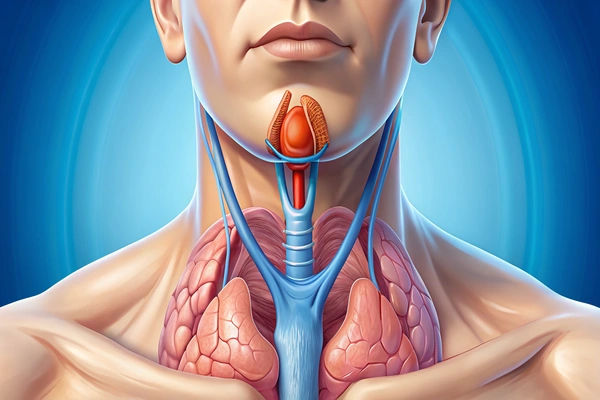Thyroid Cancer Signs: 7 Symptoms You Shouldn't Ignore
Learn to recognize the 7 key signs of thyroid cancer, from a lump in the neck to hoarseness. This guide explains what to watch for, when to see a doctor, and how the condition is diagnosed.

Written by Dr. Dhankecha Mayank Dineshbhai
Reviewed by Dr. Rohinipriyanka Pondugula MBBS
Last updated on 13th Jan, 2026

Thyroid cancer occurs when cells in your thyroid gland grow and multiply uncontrollably, forming a tumor. While the word "cancer" is daunting, thyroid cancer is generally highly treatable, especially when detected early. The key to early detection lies in recognizing its signs. Often, the symptoms are subtle or mistaken for other common conditions, leading to delays in diagnosis. This article will guide you through the seven most critical symptoms of thyroid cancer, explaining what to look for and when it's crucial to seek medical advice. Understanding these signs empowers you to take charge of your health and pursue timely evaluation. We'll also demystify the diagnostic process and discuss what steps to take if you notice any of these changes in your body.
Understanding Your Thyroid Gland
What is the Thyroid and What Does It Do?
The thyroid is a small, butterfly-shaped gland located at the base of your neck, just below your Adam's apple. Despite its size, it's a powerhouse of function, acting as the body's metabolic engine. It produces hormones (primarily T3 and T4) that regulate vital functions, including your heart rate, body temperature, weight, and energy levels. Because of its central role, when something goes wrong—like the development of a cancerous nodule—it can manifest through various physical signs in and around the neck.
The Most Common Signs of Thyroid Cancer
A Lump or Nodule in the Neck
The most frequent and often the first sign of thyroid cancer is a palpable lump, or nodule, in the front of the neck. You might notice it while looking in the mirror, swallowing, or applying moisturizer. It's important to remember that the vast majority of thyroid nodules are benign (non-cancerous). However, any new, growing, or firm lump should be evaluated by a healthcare professional. A doctor can perform a physical exam to assess its size, texture, and whether it moves easily.
Voice Changes and Hoarseness
The thyroid gland sits very close to the larynx (voice box) and the recurrent laryngeal nerve, which controls the vocal cords. If a thyroid tumor grows and presses on this nerve, it can cause persistent hoarseness or a noticeable change in your voice that doesn't resolve within a few weeks, unlike hoarseness from a common cold. This is a significant symptom that warrants investigation.
Difficulty Swallowing (Dysphagia)
As a thyroid tumor enlarges, it can begin to compress the esophagus (the tube that carries food to your stomach). This compression can lead to a sensation of pressure, tightness, or the feeling that food is getting stuck in your throat. If you experience consistent trouble swallowing solids, and especially if it progresses to liquids, it's a clear signal to consult a doctor.
Neck and Throat Pain
While not as common as a lump, pain in the front of the neck that can sometimes radiate up to the ears is a recognized symptom. This pain is typically persistent and localized to the thyroid area. It's different from the general sore throat of an infection and is more specific and constant.
Swollen Lymph Nodes
Lymph nodes are part of your body's immune system. If cancer cells break away from the main thyroid tumor, they can travel to and collect in the nearby lymph nodes in the neck, causing them to enlarge. Swollen lymph nodes that do not go down after a few weeks, especially when accompanied by a neck lump, need to be checked.
Less Common but Important Symptoms
A Persistent Cough
A cough that lingers for weeks without any other explanation, such as allergies, asthma, or a respiratory infection, can be a red flag. This occurs if the growing thyroid tumor irritates the trachea (windpipe). This isn't a productive cough with phlegm but rather a persistent, tickling, or irritating dry cough.
Breathing Difficulties
In advanced cases, a large tumor can press directly on the trachea, narrowing the airway and causing shortness of breath or a feeling of wheezing, particularly when lying down in a certain position. This is a serious symptom that requires immediate medical attention.
When to See a Doctor?
It's crucial to understand that having one of these symptoms does not mean you have thyroid cancer. Many are caused by benign conditions like thyroiditis or goiter. However, the combination of symptoms increases the need for evaluation. You should schedule an appointment with a doctor if you notice:
- A new or growing lump in your neck.
- Hoarseness that persists for more than two weeks.
- Unexplained difficulty swallowing or breathing.
- Persistent, unexplained neck pain.
If you experience any of these signs, consult a doctor online with Apollo24|7 for further evaluation. They can provide an initial assessment and guide you on the next steps, which may include a physical visit.
How is Thyroid Cancer Diagnosed?
The Role of Physical Examination
A doctor will first feel your neck to assess the thyroid gland and any lymph nodes. They will note the size, firmness, and mobility of any nodules.
Ultrasound and Imaging Scans
A thyroid ultrasound is a painless, non-invasive imaging test that uses sound waves to create pictures of your thyroid. It helps determine if a nodule is solid or fluid-filled (cystic) and can identify suspicious features. Solid nodules with irregular borders or micro-calcifications are considered more suspicious.
The Biopsy: Fine-Needle Aspiration (FNA)
If a nodule looks suspicious on an ultrasound, the next step is typically a fine-needle aspiration (FNA) biopsy. This is a simple procedure where a thin needle is inserted into the nodule to extract a sample of cells. These cells are then examined under a microscope by a pathologist to determine if they are cancerous. This is the most accurate way to diagnose thyroid cancer.
Consult Top Specialists
Not All Nodules Are Cancerous
Understanding Benign Thyroid Nodules
It's estimated that over 90% of thyroid nodules are benign. They can be caused by an overgrowth of normal thyroid tissue, thyroid cysts, inflammation (thyroiditis), or an iodine deficiency. Many people have small, benign nodules that never cause symptoms or require treatment. The goal of medical evaluation is to identify the small percentage of nodules that are cancerous.
Key Takeaways
- The most common sign of thyroid cancer is a lump or nodule in the front of the neck.
- Persistent hoarseness, trouble swallowing, and neck pain are other key symptoms to watch for.
- Most thyroid nodules are not cancerous, but any new or changing lump requires a doctor's evaluation.
- Diagnosis typically involves a physical exam, an ultrasound, and potentially a biopsy (FNA).
Thyroid cancer is highly treatable, especially when caught early, with excellent survival rates.
If you experience symptoms, don't panic—but do take action and get checked by a healthcare professional.
Conclusion
Recognizing the signs of thyroid cancer is a powerful first step in safeguarding your health. While the symptoms can be subtle, listening to your body and noting persistent changes—especially a neck lump, lasting hoarseness, or difficulty swallowing—is crucial. Remember, early detection dramatically improves outcomes, and modern medicine offers highly effective treatments for this type of cancer. If you have any concerns or identify with the symptoms discussed, the most important action you can take is to seek professional medical advice. A timely consultation can provide peace of mind or set you on the right path for treatment. If your condition does not improve after trying these methods, book a physical visit to a doctor with Apollo 24|7 for a comprehensive examination and diagnostic testing.
Consult Top Specialists
Consult Top Specialists

Dr. Anand Ravi
General Physician
2 Years • MBBS
Bengaluru
PRESTIGE SHANTHINIKETAN - SOCIETY CLINIC, Bengaluru

Dr. E Prabhakar Sastry
General Physician/ Internal Medicine Specialist
40 Years • MD(Internal Medicine)
Manikonda Jagir
Apollo Clinic, Manikonda, Manikonda Jagir
(150+ Patients)

Dr. Arunava Ghosh
General Physician/ Internal Medicine Specialist
10 Years • MBBS,MD(GENL.MED.),DM(ENDOCRINOLOGY)
Kolkata
VDC Clinic, Kolkata
Aditya Singh
Endocrinologist
8 Years • MBBS
Bengaluru
Apollo One Electronic City, Bengaluru

Dr. Chaithanya R
Internal Medicine Specialist Diabetologist
16 Years • MBBS, MD Internal Medicine, Fellowship in Diabetes(UK), CCEBDM(PHFI)
Bangalore
Apollo Clinic Bellandur, Bangalore
(75+ Patients)
Consult Top Specialists

Dr. Anand Ravi
General Physician
2 Years • MBBS
Bengaluru
PRESTIGE SHANTHINIKETAN - SOCIETY CLINIC, Bengaluru

Dr. E Prabhakar Sastry
General Physician/ Internal Medicine Specialist
40 Years • MD(Internal Medicine)
Manikonda Jagir
Apollo Clinic, Manikonda, Manikonda Jagir
(150+ Patients)

Dr. Arunava Ghosh
General Physician/ Internal Medicine Specialist
10 Years • MBBS,MD(GENL.MED.),DM(ENDOCRINOLOGY)
Kolkata
VDC Clinic, Kolkata
Aditya Singh
Endocrinologist
8 Years • MBBS
Bengaluru
Apollo One Electronic City, Bengaluru

Dr. Chaithanya R
Internal Medicine Specialist Diabetologist
16 Years • MBBS, MD Internal Medicine, Fellowship in Diabetes(UK), CCEBDM(PHFI)
Bangalore
Apollo Clinic Bellandur, Bangalore
(75+ Patients)
More articles from Thyroid Cancer
Frequently Asked Questions
What does a thyroid cancer lump feel like?
A thyroid nodule typically feels like a firm, distinct lump in the lower front of your neck. It may move slightly when you swallow. It's often not painful, but any persistent lump should be evaluated.
Can you have thyroid cancer with no symptoms?
Yes, especially in the early stages. Many thyroid cancers are discovered incidentally during imaging tests (like a CT scan for an unrelated issue) before they cause any noticeable symptoms.
Is thyroid cancer curable?
Yes, the overall cure rate for the most common types of thyroid cancer (papillary and follicular) is very high, often exceeding 98% when diagnosed and treated early.
What are the risk factors for thyroid cancer?
Key risk factors include a family history of thyroid cancer, exposure to high levels of radiation (especially to the head and neck during childhood), and certain genetic syndromes (like MEN2). However, many people diagnosed have no known risk factors.
What is the survival rate for thyroid cancer?
Survival rates are among the highest of all cancers. The 5-year relative survival rate for localized thyroid cancer (cancer that hasn't spread outside the thyroid) is nearly 100%.
 (1).webp)



